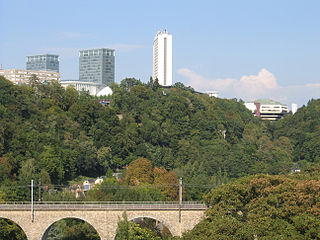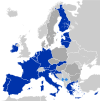
The secretariat of the European Parliament is the administrative body of the European Parliament headed by a Secretary-General. It is based in the Kirchberg district of Luxembourg City and around the Brussels-Luxembourg Station in Brussels and employs 4000 officials.

Directorate General for Communications Networks, Content and Technology or "DG Connect" is a Directorate-General of the European Commission. DG Connect is responsible for managing the Digital Agenda.

The Directorate-General for Research and Innovation is a Directorate-General of the European Commission, located in Brussels, and responsible for the European Union's research and innovation policy and coordination of research and innovation activities. It is headed by Commissioner Carlos Moedas and Director-General Jean-Eric Paquet.

The Directorate-General for Agriculture and Rural Development or DG AGRI is a Directorate-General of the European Commission. The DG AGRI is responsible for the European Union policy area of agriculture and rural development. The work of the DG AGRI is closely linked with the Common Agricultural Policy (CAP).

The Directorate-General for Environment is a Directorate-General of the European Commission, responsible for the European Union policy area of the environment.

The Directorate-General for Maritime Affairs and Fisheries or DG MARE is a Directorate-General of the European Commission, responsible for the policy area of fisheries, the Law of the Sea and Maritime Affairs of the European Union.

The Directorate-General for Mobility and Transport is a Directorate-General of the European Commission responsible for transport within the European Union.
The Education, Audiovisual and Culture Executive Agency or EACEA is an agency of the European Union located in Brussels, Belgium. It manages parts of the Union's programs in education, culture, and audiovisual fields.

The Directorate-General for Competition is a Directorate-General of the European Commission, located in Brussels. The DG Competition is responsible for establishing and implementing competition policy for the European Union. The DG Competition has a dual role in antitrust enforcement: an investigative role and a decision-making role.

The Directorate-General for Financial Stability, Financial Services and Capital Markets Union is a Directorate-General of the European Commission. It is one of the thirty three DG's that are created and named to reflect their functions.

The Directorate-General for Justice and Consumers is a Directorate-General of the European Commission. The role of the body is to ensure that the whole European Union (EU) is an area of freedom, security and justice. The specific tasks and responsibilities of the DG are laid down by the Treaty of Rome, the Treaty of Amsterdam which came into force on 1 May 1999 and the conclusions of the European Council meeting in Tampere (Finland) in October 1999.

The Directorate-General for Trade is a Directorate-General of the European Commission. DG TRADE works on securing prosperity, solidarity and security in Europe and around the globe. It covers a wide area from manufactured goods to services, intellectual property and investment.

The Directorate-General for Education, Youth, Sport and Culture is a Directorate-General of the European Commission.

The Directorate-General for Interpretation is a Directorate-General of the European Commission. It is the European Commission's interpreting service and conference organiser and provides interpreters for around 11,000 meetings every year, thus being the largest interpreting service in the world.

The Ministry of Transport and Infrastructure is a government ministry office of the Republic of Turkey, responsible for transport, information and communication services in Turkey. Its head office is in Ankara. The current minister is Mehmet Cahit Turhan, in office since July 2018.

The Commissioner for Justice, Consumers and Gender Equality is a post in the European Commission. The current commissioner is Věra Jourová.

The Directorate-General for Health and Food Safety, until 2014 known as the Directorate-General for Health and Consumers, is a Directorate-General of the European Commission. The DG is responsible for the implementation of European Union laws on the safety of food and other products, on consumers' rights and on the protection of people's health. In 2006, DG Sanco launched the public Health-EU portal to provide European citizens with easy access to comprehensive information on Public Health initiatives and programmes at EU level.

The Directorate-General for Energy, also internally the abbreviation ENER is used, is a Directorate-General of the European Commission. The DG Ener is in operation since 17 February 2010 when it was split from the Transport DG.

The Directorate-General for Climate Action or DG CLIMA, established in February 2010, is a department of the European Commission. The current Commissioner is Miguel Arias Cañete. The DG is headed by Mauro Petriccione, Director General for Climate Action. Climate change was previously the responsibility of the Directorate-General for the Environment. DG Climate Change participates in international negotiations on climate, helps the European Union to deal with the consequences of climate change and encourages it to meet its targets for 2020. It also develops and implements the EU Emissions Trading System.

The Directorate-General for Migration and Home Affairs is a Directorate-General of the European Commission. The role of the body is to ensure the EU's security, to build a common EU migration and asylum policy, and to promote dialogue and cooperation with non-EU countries. Thereby, it contributes to the Area of freedom, security and justice (AFSJ).









